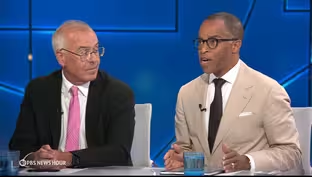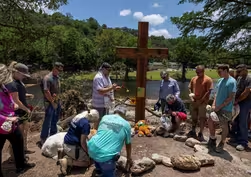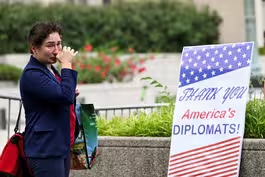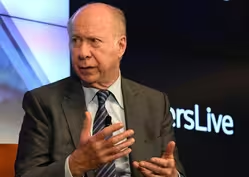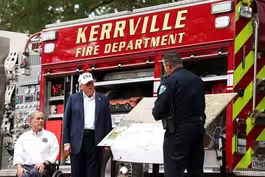
PKK begins disarming in step toward peace with Turkey
Clip: 7/11/2025 | 9m 17sVideo has Closed Captions
After decades of insurgency against Turkey, PKK begins disarming in step toward peace
For the first time in four decades, the Kurdistan Workers Party, known as the PKK, is laying down its arms and says it will end its insurgency against Turkey. The separatist group’s disbandment comes after its imprisoned leader announced an end to its 41-year armed struggle and a transition to democratic politics. Nick Schifrin reports.
Problems playing video? | Closed Captioning Feedback
Problems playing video? | Closed Captioning Feedback
Major corporate funding for the PBS News Hour is provided by BDO, BNSF, Consumer Cellular, American Cruise Lines, and Raymond James. Funding for the PBS NewsHour Weekend is provided by...

PKK begins disarming in step toward peace with Turkey
Clip: 7/11/2025 | 9m 17sVideo has Closed Captions
For the first time in four decades, the Kurdistan Workers Party, known as the PKK, is laying down its arms and says it will end its insurgency against Turkey. The separatist group’s disbandment comes after its imprisoned leader announced an end to its 41-year armed struggle and a transition to democratic politics. Nick Schifrin reports.
Problems playing video? | Closed Captioning Feedback
How to Watch PBS News Hour
PBS News Hour is available to stream on pbs.org and the free PBS App, available on iPhone, Apple TV, Android TV, Android smartphones, Amazon Fire TV, Amazon Fire Tablet, Roku, Samsung Smart TV, and Vizio.
Providing Support for PBS.org
Learn Moreabout PBS online sponsorshipAMNA NAWAZ: Today, for the first time in four decades, the Kurdistan Workers Party, known as the PKK, is laying down its arms and says it will end its insurgency against Turkey.
The separatist group's disbandment comes after its imprisoned leader, Abdullah Ocalan, announced an end to its 41-year armed struggle and a transition to democratic politics.
Today marks the PKK's first concrete steps toward peace.
Here's Nick Schifrin with more.
NICK SCHIFRIN: Today, they came down from the mountains.
So rifles that for four decades have been drenched in blood can now be destroyed by fire.
Kurdish separatists hope their armed struggle for independence can now become peaceful, said 47-year-old Kurdish separatist leader Bese Hozat.
BESE HOZAT, Co-Chair, Kurdistan Communities Union (through translator): To wage our freedom, democracy and socialist struggle with methods of legal and democratic politics, we voluntarily destroy our weapons before your presence as a step of goodwill and determination.
NICK SCHIFRIN: For years, these fighters, often no older than 20, and their weapons targeted Turkish forces, as seen in their propaganda videos.
Some 30 million Kurds live across Turkey, Syria, Iraq and Iran.
And in Southeast Turkey and across the border in Iraq, the Kurdistan Worker's Party has been waging an insurgency, demanding greater rights and an independent state.
Their methods have been bloody and include terrorist attacks on civilian targets.
Turkey says the 41-year conflict has killed more than 40,000 people.
ZUBEYIR AYDAR, Executive Council Member, Kurdistan Communities Union (through translator): The Kurds and the Kurdish movement took these steps for a peaceful solution and an honest solution.
The Kurds took a risk, but this risk has been taken for a peaceful democratic solution.
NICK SCHIFRIN: Zubeyir Aydar heads the Kurdish separatist movement's political wing.
Turkey put out a warrant for his arrest in 2009.
He lives in exile.
We spoke to him from Brussels.
A Turkish official today said this was a -- quote - - "irreversible turning point toward peace."
Do you believe this is a pause in fighting or this is an irreversible step toward peace?
ZUBEYIR AYDAR (through translator): We don't want to be cheated or lied to and we don't want to cheat anyone.
We deeply hope that the opposite side, the Turkish side, is honest as well in the peaceful negotiations.
NICK SCHIFRIN: For years, Kurdish protesters have accused the Turkish state of cracking down on Kurdish rights and culture.
And, for years, the Turkish military has attacked the Kurdistan Worker's Party and its allies in Turkey and beyond with airstrikes that international humanitarian organizations say have violated human rights.
Turkey has set up military bases and outposts in Northern Syria, where Kurds backed by the United States have fought ISIS.
Turkey's also created bases in Northern Iraq, where the Kurdistan region is semiautonomous.
But, earlier this year, longtime Kurdistan Worker's Party leader Abdullah Ocalan called for peace.
And in a rare video this week, he said his group would disarm and expected Turkey to provide greater rights.
ZUBEYIR AYDAR (through translator): First of all, the Kurdish community should be constitutionally recognized in Turkey.
The Kurds have been ignored for a very long time.
The Kurds need to be able to live with their own identity and their own culture.
Political prisoners must be released and the fighters need to have rights to live and do politics in Turkey.
NICK SCHIFRIN: And have you seen today Turkey take any of those steps?
ZUBEYIR AYDAR (through translator): Turkey says with words they will take these steps, but these steps haven't been taken.
We hope that Turkey will not miss this opportunity, this peace opportunity.
NICK SCHIFRIN: Turkish President Recep Tayyip Erdogan has long advocated for harsh crackdowns on the Kurds, but this week he predicted peace.
RECEP TAYYIP ERDOGAN, Turkish President (through translator): The winners of this will be the whole of Turkey, Turks, Kurds and Arabs.
Then it will be our entire region and all our brethren in the region.
NICK SCHIFRIN: And I'm now joined by Jim Jeffrey, the former U.S. ambassador to Turkey, as well as to Iraq, who was most recently the special representative for Syria under the first Trump administration.
Ambassador Jeffrey, thanks very much.
Welcome back to the "News Hour."
Bottom line, how significant is this event that we saw today?
The Kurdistan Worker's Party burning their rifles, calling for their armed struggle to be now waged peaceful?
JAMES JEFFREY, Former U.S.
Ambassador to Turkey: This is a huge step forward of a process that began about six months ago.
It signifies the end of a 40-year terrorist insurgent campaign in Turkey, Iraq and Syria against the Turkish state and at times against various other elements.
It is a dramatic move forward for the whole region and is something that will really stabilize the Northern Levant in very many important ways.
NICK SCHIFRIN: You heard President Erdogan say in the story that ran just before you and I started speaking, say that the winners of this will be the whole of Turkey.
Of course, he was not the one who really pushed this.
It was actually a member of his coalition.
Nonetheless, why has he come out and supported this, and why now?
JAMES JEFFREY: Well, why now is partially domestic politics in Turkey.
Erdogan wants to move forward with changes in the Constitution.
And the PKK, besides a terrorist movement, has also an associated political party that has the third largest number of seats in Parliament.
So, there is somewhat opportunistic political reason for this as well.
But, nonetheless, Erdogan, back more than a decade ago when I was in Turkey as ambassador, was working hard to try to get cease-fires and some kind of understanding with the PKK and other Kurdish groups.
NICK SCHIFRIN: In the story that we ran right before, you heard Zubeyir Aydar, the Kurdish separatist political leader, say a few things.
He said -- quote -- "The Kurds took a risk" and -- quote -- "We deeply hope that the opposite side, the Turkish side, is honest."
Do you believe that Turkey will proceed honestly going forward?
JAMES JEFFREY: I believe that the Turkish government, particularly the president, Erdogan, and the leader of the other coalition party, Bahceli, are very serious.
Now, what the Kurds are talking about is continued democratic processes that would give Kurds their rights, language rights, other equality within Turkey.
And that is still something that we have to see how it develops on the ground.
NICK SCHIFRIN: Not only that.
Zubeyir Aydar listed a few things that he expected Turkey to do.
He said that the Kurdish community should be constitutionally recognized in Turkey, Kurds need to be able to live with their own identity, their own culture, political prisoners need to be released, and fighters need to have rights to live and do politics in Turkey.
Can all that really happen?
JAMES JEFFREY: That's a good starting list.
I can see the Turks granting some of it because some of it's already been granted, Turkish identity, particularly in areas where they're the majority.
And the Turks are talking about reconciliation, but they're also talking about accountability.
And some of these PKK fighters have verifiable charges of terrorism against them, and that's going to have to be worked out as well.
NICK SCHIFRIN: As you know better than anyone, these divisions here are deep.
How can this peace really hold, given those divisions?
JAMES JEFFREY: Well, for two reasons.
First of all, the armed struggle hasn't worked.
The PKK has been decisively defeated militarily.
But, secondly, over the past 20-plus years, particularly since President Erdogan came to power, the Turkish state has been somewhat more open to Kurdish identity, Kurdish culture, Kurdish language, and other things.
It's not what many Kurds want, but it is a huge step forward from the Turkey that I knew in the 1980s and 1990s.
NICK SCHIFRIN: And, finally, Jim Jeffrey, the U.S, of course, has had a complex relationship with Kurds across the region, but have allied with Kurds, especially in Syria, against the Islamic State.
How does a deal like this today affect the U.S. relationship with Kurds in the other countries, but especially Syria?
JAMES JEFFREY: It's huge.
Kurds, including the PKK Kurds and the many Kurds in Iraq and Turkey and elsewhere who are not part of the PKK, know that we were an honest broker.
They know that we were pushing for both peace and, at the same time, helping Ankara fight terrorism.
We also had people on the ground, Foreign Service offices, so important to our diplomacy, working with all sides, often in dangerous conditions, to try to move this forward.
Again, the credit goes to the Turkish people, the government, the PKK and their supporters, but the U.S. played a big role here also.
NICK SCHIFRIN: Ambassador James Jeffrey, thank you very much.
JAMES JEFFREY: Thank you.
Brooks and Capehart on federal response to Texas floods
Video has Closed Captions
Clip: 7/11/2025 | 11m 24s | Brooks and Capehart on the federal response to the Texas flooding disaster (11m 24s)
Grieving daughter says mother’s death in flood was avoidable
Video has Closed Captions
Clip: 7/11/2025 | 10m 32s | Grieving daughter says mother’s death in Texas flood was avoidable (10m 32s)
How the toy industry is facing Trump's tariffs
Video has Closed Captions
Clip: 7/11/2025 | 6m 20s | How the toy industry is feeling the effects of Trump's tariffs (6m 20s)
News Wrap: State Department lays off more than 1,300
Video has Closed Captions
Clip: 7/11/2025 | 6m 1s | News Wrap: State Department lays off more than 1,300 in latest cuts to federal workforce (6m 1s)
Remembering presidential advisor David Gergen
Video has Closed Captions
Clip: 7/11/2025 | 5m 19s | Remembering presidential advisor and political analyst David Gergen (5m 19s)
Trump tours catastrophic flood damage in central Texas
Video has Closed Captions
Clip: 7/11/2025 | 2m 55s | Trump tours catastrophic flood damage in central Texas, defends state and federal response (2m 55s)
Providing Support for PBS.org
Learn Moreabout PBS online sponsorshipSupport for PBS provided by:
Major corporate funding for the PBS News Hour is provided by BDO, BNSF, Consumer Cellular, American Cruise Lines, and Raymond James. Funding for the PBS NewsHour Weekend is provided by...
